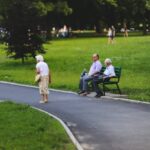In two recently published studies, researchers have shown that older adults who continue to challenge themselves with new learning experiences are less likely to suffer from loneliness or depression, even in times of profound disruption. The work, conducted at the University of California, Riverside, highlights how acquiring unfamiliar skills can help foster resilience and protect mental health in later life. Published in PLOS Mental Health, the findings emphasise the long-term benefits of sustained cognitive engagement, particularly during periods of uncertainty such as the early years of the COVID-19 pandemic.
Rachel Wu, a psychologist at UC Riverside and one of the study authors, noted that the process of learning is rarely easy at first. “Learning can be difficult and uncomfortable in the short term,” she explained. “But that short-term discomfort actually helps protect us in the long run.” Her team’s research suggests that actively working through the frustration of new learning experiences equips older adults with greater adaptability and mental strength when confronted with unexpected life changes.
The studies examined how adults of different ages adjusted to the upheaval of the pandemic. In the first study, participants were divided into two groups: one that included adults as young as 19, and another that focused exclusively on people aged 50 and above. Some individuals in the older cohort had previously taken part in a structured intervention programme designed to encourage curiosity and foster the ability to learn new skills. Across both groups, participants were asked how much time they spent learning during the pandemic year and how their mental health changed over that period.
Lead author Lilian Azer, formerly a graduate student at UC Riverside, said the findings revealed a clear and consistent pattern. “People who were actively learning fared better in terms of mental health outcomes, especially older adults who might otherwise have been more vulnerable to isolation and stress,” she explained. The participants reported on measures such as depression, loneliness, and general wellbeing, as well as their perceptions of memory, focus, and decision-making ability. Those who had engaged in skill-building did not necessarily feel happier immediately. Still, a year later, they demonstrated significantly greater resilience than peers who had not taken up new challenges.
A second study took a closer look at adults over the age of 58 who had previously enrolled in classes such as digital photography, drawing, or language learning before the pandemic began. When compared with peers who had not participated in such programmes, these older learners appeared to cope better emotionally during the crisis. Wu explained that the habit of learning seemed to strengthen their ability to adapt: “You want to have the machinery of learning dusted off, so it works when you need it,” she said. The pandemic, with its closure of formal learning spaces, also revealed that self-directed learning—through hobbies or digital tools—could provide lasting psychological benefits even without structured support.
The researchers argue that their work addresses a long-overlooked area in the scientific literature. Much of what is known about the effects of learning is confined to early adulthood, leaving later life largely unexamined. Wu believes this gap needs to be closed. “There’s so little research on how learning affects people after their formal education ends,” she observed. “But we know that if you’re not learning, you’re probably declining, no matter what age you are.” She hopes the findings will encourage policymakers and healthcare providers to view continuous learning as a cornerstone of healthy ageing, on par with physical activity. “You don’t want to wait until you have to learn something in a crisis,” Wu added. “Seek out challenges. Keep growing. That’s how you stay ready.”
More information: Lilian Azer et al, Subjective executive functioning and skill learning during the COVID-19 pandemic associated with perceived loneliness, depressive symptoms, and well-being, PLOS Mental Health. DOI: 10.1371/journal.pmen.0000372
Journal information: PLOS Mental Health Provided by University of California – Riverside








